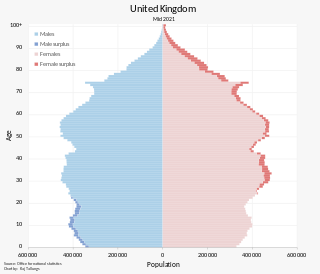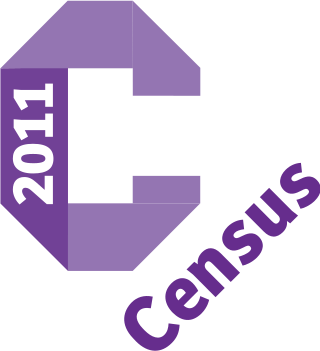
The population of the United Kingdom was estimated at over 67.0 million in 2020. It is the 21st most populated country in the world and has a population density of 270 people per square kilometre, with England having significantly greater density than Wales, Scotland, and Northern Ireland. Almost a third of the population lives in south east England, which is predominantly urban and suburban, with about 9 million in the capital city, London, whose population density is just over 5,200 per square kilometre.

The demography of England has since 1801 been measured by the decennial national census, and is marked by centuries of population growth and urbanization. Due to the lack of authoritative contemporary sources, estimates of the population of England for dates prior to the first census in 1801 vary considerably. The population of England at the 2021 census was 56,489,800.
The foreign-born population of the United Kingdom includes immigrants from a wide range of countries who are resident in the United Kingdom. In the period January to December 2016, there were groups from 22 foreign countries that were estimated to consist of at least 100,000 individuals residing in the UK.

The demography of Scotland includes all aspects of population, past and present, in the area that is now Scotland. Scotland had a population of 5,463,300 in 2019. The population growth rate in 2011 was estimated as 0.6% per annum according to the 2011 GROS Annual Review.
Australians in the United Kingdom, or Australian Britons, include Australians who have become residents or citizens of the United Kingdom. The largest segment of Australia's diaspora of 1 million resides in the United Kingdom.

French migration to the United Kingdom is a phenomenon that has occurred at various points in history. The Norman Conquest of England by William the Conqueror in 1066 resulted in the arrival of Normans, while in the 16th and 17th centuries Protestant Huguenots fled religious persecution to East London. Other waves are associated with monasticism, particularly post-conquest Benedictines and Cistercians, aristocracy fleeing the French Revolution, expulsion of religious orders by Third Republic France, and current expats.

Portuguese in the United Kingdom are citizens or residents of the UK who are connected to the country of Portugal by birth, descent or citizenship.
East Asians in the United Kingdom are East Asians living in the United Kingdom. They have been present in the country since the 17th century and primarily originate from countries such as China, Hong Kong, Japan, South Korea and Taiwan. They are called "East Asian" or "Oriental", although – dependent upon the context – the use of the term "Oriental" might be considered by some to be derogatory or offensive. In the 2001 British census, the term Chinese or Other is used.
Ukrainians in the United Kingdom consist mainly of British citizens of Ukrainian descent.

The term Other White, or White Other, is a classification of ethnicity in the United Kingdom used in documents, such as the 2011 UK Census, to describe people who self-identify as white persons who are not of the English, Welsh, Scottish, Romani or Irish ethnic groupings.
Kenyan migration to the United Kingdom has been occurring for many decades. As a result, many people in the UK were born in Kenya, or have Kenyan ancestry. Many Kenyan people who migrated to the UK are of South Asian extraction.
British Moroccans are citizens and/or residents of the United Kingdom whose ethnic origins lie fully or partially in Morocco.
Czechs in the United Kingdom refers to the phenomenon of Czech people migrating to the United Kingdom from the Czech Republic or from the political entities that preceded it, such as Czechoslovakia. There are some people in the UK who were either born in the Czech lands or have Czech ancestry, some of whom descended from Jewish refugees who arrived during World War II.
Baltic people in the United Kingdom are those born or raised in the UK, or residents, who are of ethnically Baltic, meaning Latvian or Lithuanian, origin.
Ugandan migration to the United Kingdom refers to the movement of people from Uganda. Today, a small proportion of people in the United Kingdom were either born in Uganda, or have Ugandan ancestry.
Trinidadian and Tobagonian British people are citizens or residents of the United Kingdom whose ethnic origins lie fully or partially in Trinidad and Tobago.

New Zealanders in the United Kingdom are citizens or residents of the United Kingdom who originate from New Zealand.
Mauritian diaspora in the United Kingdom are British people with Mauritian descent, or who were born in Mauritius. The 2001 UK Census recorded 27,078 Mauritian-born people living in the UK. The 2011 UK Census recorded 40,890 Mauritian-born residents in England, 434 in Wales, 571 in Scotland, and 83 in Northern Ireland. The Office for National Statistics estimates that in 2014, 41,000 people born in Mauritius were resident in the UK.

A census of the population of the United Kingdom is taken every ten years. The 2011 census was held in all counties of the UK on 27 March 2011. It was the first UK census which could be completed online via the Internet. The Office for National Statistics (ONS) is responsible for the census in England and Wales, the General Register Office for Scotland (GROS) is responsible for the census in Scotland, and the Northern Ireland Statistics and Research Agency (NISRA) is responsible for the census in Northern Ireland.
Congolese in the United Kingdom consist of immigrants from the Democratic Republic of the Congo (DRC) living in the United Kingdom as well as their British-born descendants. The demonym Congolese can also refer to people from the Republic of Congo, of whom there are fewer living in the UK.








